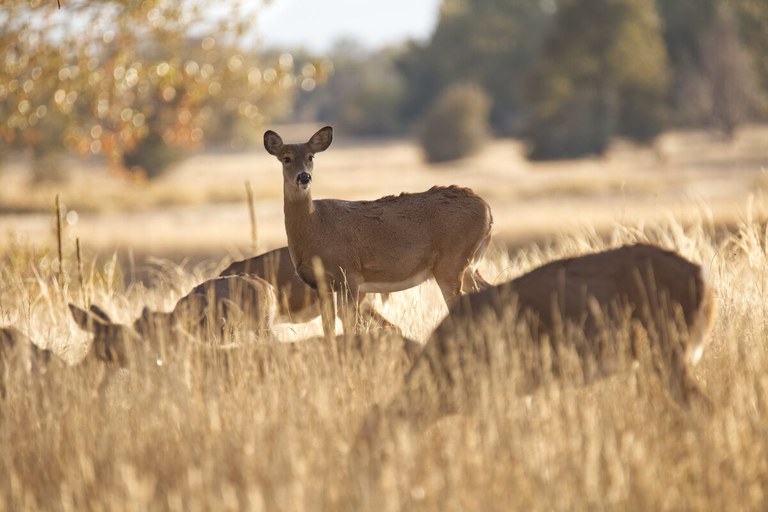Discovery of coronavirus infections in white-tailed deer can help predict or prevent the emergence of novel variants.
Problem
Can we prevent potential spillback of SARS-CoV-2 from wild animals to humans?
- The global spread of SARS-CoV-2 (the virus that causes COVID-19 in humans) poses risks for spillover transmission to nonhuman hosts, which could in turn act as reservoirs for the virus, and potentially "spillback" to human hosts.
Findings
A team of researchers reported the first direct evidence of SARS-CoV-2 virus in any free-living species when they discovered that more than 80 percent of the white-tailed deer sampled in different parts of Iowa between December 2020 and January 2021 tested positive for the virus.
- The team examined nearly 300 samples collected as a part of a routine health surveillance program in Iowa, finding several different SARS-CoV-2 lineages circulating within geographically confined herds. This research suggested the occurrence of multiple independent spillover events from humans to deer, followed by local deer-to-deer transmission.
Impact
This discovery highlights the urgent need to support and sustain a robust and proactive "one health" approach that includes surveillance programs to monitor the spread of SARS-CoV-2 within deer and other susceptible wildlife species in the battle against the long-term persistence and evolution of this coronavirus.
- A better understanding of the ecology, molecular evolution, and spread of SARS-CoV-2 will help scientists and public health officials to predict and even prevent the emergence of future infectious diseases with pandemic and spillover potential.
Research Credit
Team
- Suresh V. Kuchipudi, Meera Surendran-Nair, Rachel M. Ruden, Michele Yon, Ruth H. Nissly, Kurt J. Vandegrift, Rahul K. Nelli, Lingling Li, Bhushan M. Jayarao, Costas D. Maranas, Nicole Levine, Katriina Willgert, Andrew J.K. Conlan, Randall J. Olsen, James J. Davis, James M. Musser, Peter J. Hudson, Vivek Kapur
Participating Departments
Partners
- Iowa Department of Natural Resources (DNR)
- Penn State Eberly College of Sciences
- Iowa State University
- Penn State College of Engineering
- University of Cambridge
- Weill Cornell Medical College
- Argonne National Laboratory
- Houston Methodist Research Institute
- Houston Methodist Hospital
Competitive Funding
- USDA NIFA (AFRI)
- US Fish and Wildlife Service (Wildlife and Sport Fish Restoration Program)
- Penn State Huck Institutes of the Life Sciences
- Iowa DNR (Fish and Game Protection Fund)
- Houston Methodist Academic Institute (Infectious Diseases Fund)
- National Institutes of Health
- NSF (Ecology and Evolution of Infectious Diseases Program)
Federal and State Appropriations
- USDA NIFA Hatch Project PEN04748, Accession #1023391
Emerging Discoveries
Published Research
Multiple spillovers from humans and onward transmission of SARS-CoV-2 in white-tailed deer.
-
Kuchipudi, S. V., Surendran-Nair, M., Ruden, R. M., Yon, M., Nissly, R. H., Vandegrift, K. J., Nelli, R. K., Li, L., Jayarao, B. M., Maranas, C. D., Levine, N., Willgert, K., Conlan, A. J. K., Olsen, R. J., Davis, J. J., Musser, J. M., Hudson, P. J., & Kapur, V. (2022). Multiple spillovers from humans and onward transmission of SARS-CoV-2 in white-tailed deer. Proceedings of the National Academy of Sciences of the United States of America, 119(6), [e2121644119]. https://doi.org/10.1073/pnas.2121644119
Office for Research and Graduate Education
Address
217 Agricultural Administration BuildingUniversity Park, PA 16802-2600
- Email agresearch@psu.edu
- Office 814-865-3136
Office for Research and Graduate Education
Address
217 Agricultural Administration BuildingUniversity Park, PA 16802-2600
- Email agresearch@psu.edu
- Office 814-865-3136



